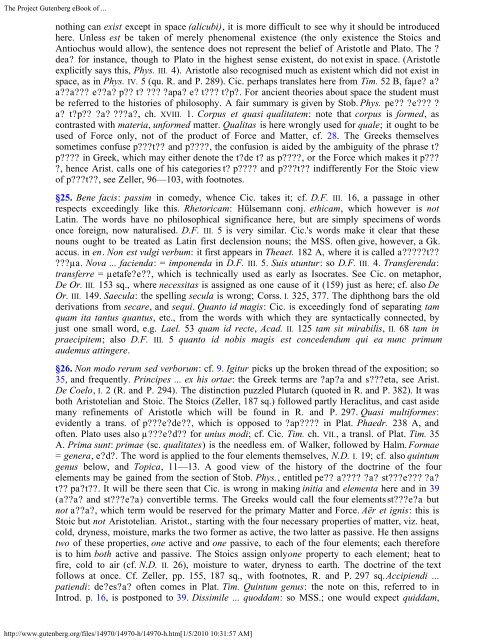academica of cicero. - 912 Freedom Library
academica of cicero. - 912 Freedom Library
academica of cicero. - 912 Freedom Library
Create successful ePaper yourself
Turn your PDF publications into a flip-book with our unique Google optimized e-Paper software.
The Project Gutenberg eBook <strong>of</strong> ...<br />
nothing can exist except in space (alicubi), it is more difficult to see why it should be introduced<br />
here. Unless est be taken <strong>of</strong> merely phenomenal existence (the only existence the Stoics and<br />
Antiochus would allow), the sentence does not represent the belief <strong>of</strong> Aristotle and Plato. The ?<br />
dea? for instance, though to Plato in the highest sense existent, do not exist in space. (Aristotle<br />
explicitly says this, Phys. III. 4). Aristotle also recognised much as existent which did not exist in<br />
space, as in Phys. IV. 5 (qu. R. and P. 289). Cic. perhaps translates here from Tim. 52 B, faµe? a?<br />
a??a??? e??a? p?? t? ??? ?apa? e? t??? t?p?. For ancient theories about space the student must<br />
be referred to the histories <strong>of</strong> philosophy. A fair summary is given by Stob. Phys. pe?? ?e??? ?<br />
a? t?p?? ?a? ???a?, ch. XVIII. 1. Corpus et quasi qualitatem: note that corpus is formed, as<br />
contrasted with materia, unformed matter. Qualitas is here wrongly used for quale; it ought to be<br />
used <strong>of</strong> Force only, not <strong>of</strong> the product <strong>of</strong> Force and Matter, cf. 28. The Greeks themselves<br />
sometimes confuse p???t?? and p????, the confusion is aided by the ambiguity <strong>of</strong> the phrase t?<br />
p???? in Greek, which may either denote the t?de t? as p????, or the Force which makes it p???<br />
?, hence Arist. calls one <strong>of</strong> his categories t? p???? and p???t?? indifferently For the Stoic view<br />
<strong>of</strong> p???t??, see Zeller, 96—103, with footnotes.<br />
§25. Bene facis: passim in comedy, whence Cic. takes it; cf. D.F. III. 16, a passage in other<br />
respects exceedingly like this. Rhetoricam: Hülsemann conj. ethicam, which however is not<br />
Latin. The words have no philosophical significance here, but are simply specimens <strong>of</strong> words<br />
once foreign, now naturalised. D.F. III. 5 is very similar. Cic.'s words make it clear that these<br />
nouns ought to be treated as Latin first declension nouns; the MSS. <strong>of</strong>ten give, however, a Gk.<br />
accus. in en. Non est vulgi verbum: it first appears in Theaet. 182 A, where it is called a?????t??<br />
???µa. Nova ... facienda: = imponenda in D.F. III. 5. Suis utuntur: so D.F. III. 4. Transferenda:<br />
transferre = µetafe?e??, which is technically used as early as Isocrates. See Cic. on metaphor,<br />
De Or. III. 153 sq., where necessitas is assigned as one cause <strong>of</strong> it (159) just as here; cf. also De<br />
Or. III. 149. Saecula: the spelling secula is wrong; Corss. I. 325, 377. The diphthong bars the old<br />
derivations from secare, and sequi. Quanto id magis: Cic. is exceedingly fond <strong>of</strong> separating tam<br />
quam ita tantus quantus, etc., from the words with which they are syntactically connected, by<br />
just one small word, e.g. Lael. 53 quam id recte, Acad. II. 125 tam sit mirabilis, II. 68 tam in<br />
praecipitem; also D.F. III. 5 quanto id nobis magis est concedendum qui ea nunc primum<br />
audemus attingere.<br />
§26. Non modo rerum sed verborum: cf. 9. Igitur picks up the broken thread <strong>of</strong> the exposition; so<br />
35, and frequently. Principes ... ex his ortae: the Greek terms are ?ap?a and s???eta, see Arist.<br />
De Coelo, I. 2 (R. and P. 294). The distinction puzzled Plutarch (quoted in R. and P. 382). It was<br />
both Aristotelian and Stoic. The Stoics (Zeller, 187 sq.) followed partly Heraclitus, and cast aside<br />
many refinements <strong>of</strong> Aristotle which will be found in R. and P. 297. Quasi multiformes:<br />
evidently a trans. <strong>of</strong> p???e?de??, which is opposed to ?ap???? in Plat. Phaedr. 238 A, and<br />
<strong>of</strong>ten. Plato uses also µ???e?d?? for unius modi; cf. Cic. Tim. ch. VII., a transl. <strong>of</strong> Plat. Tim. 35<br />
A. Prima sunt: primae (sc. qualitates) is the needless em. <strong>of</strong> Walker, followed by Halm. Formae<br />
= genera, e?d?. The word is applied to the four elements themselves, N.D. I. 19; cf. also quintum<br />
genus below, and Topica, 11—13. A good view <strong>of</strong> the history <strong>of</strong> the doctrine <strong>of</strong> the four<br />
elements may be gained from the section <strong>of</strong> Stob. Phys., entitled pe?? a???? ?a? st???e??? ?a?<br />
t?? pa?t??. It will be there seen that Cic. is wrong in making initia and elementa here and in 39<br />
(a??a? and st???e?a) convertible terms. The Greeks would call the four elements st???e?a but<br />
not a??a?, which term would be reserved for the primary Matter and Force. Aër et ignis: this is<br />
Stoic but not Aristotelian. Aristot., starting with the four necessary properties <strong>of</strong> matter, viz. heat,<br />
cold, dryness, moisture, marks the two former as active, the two latter as passive. He then assigns<br />
two <strong>of</strong> these properties, one active and one passive, to each <strong>of</strong> the four elements; each therefore<br />
is to him both active and passive. The Stoics assign only one property to each element; heat to<br />
fire, cold to air (cf. N.D. II. 26), moisture to water, dryness to earth. The doctrine <strong>of</strong> the text<br />
follows at once. Cf. Zeller, pp. 155, 187 sq., with footnotes, R. and P. 297 sq. Accipiendi ...<br />
patiendi: de?es?a? <strong>of</strong>ten comes in Plat. Tim. Quintum genus: the note on this, referred to in<br />
Introd. p. 16, is postponed to 39. Dissimile ... quoddam: so MSS.; one would expect quiddam,<br />
http://www.gutenberg.org/files/14970/14970-h/14970-h.htm[1/5/2010 10:31:57 AM]















